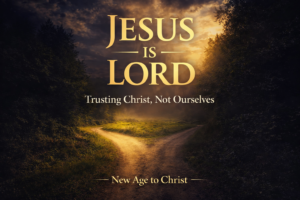⏱️ Estimated Reading Time: 7 min read
God’s Voice Heard
What a glorious moment the transfiguration was in Christ’s ministry. It takes place in Matthew 17. At this point, Jesus had twelve disciples, and much had already taken place since he had called them to himself: sermons, teachings, and parables; miracles and healings; the commissioning of his followers; the feeding of thousands. And speaking of Jesus, Peter had just confessed Him be the Messiah, “Christ, the Son of the living God” (Matt 16:16). Much has happened up to this point, but something changes during the transfiguration of Christ: his disciples’ perspective concerning him.
To his disciples, Jesus is clearly a prophet, a teacher, a healer, and a minister—a “man among men.” However, there’s something special about this man. Here, that something special is made clear—it’s something Peter said in Matthew 16 but didn’t truly behold until Matthew 17.
Jesus takes three of his disciples—Peter, James, and John—up on a high mountain. And Matthew 17:2 very simply reads: “And [Jesus] was transfigured before them.” What did this entail? Well, Jesus’ face “shone like the sun.” His “clothes became white as light.” Yes, Jesus is a prophet, teacher, healer, and minister; but here, at the transfiguration, he’s revealed as something much more. He is divine.
Just think about this. Your pastor may teach, counsel, and disciple you well. But if he took you and two friends on top of a mountain, and his face started shining like the sun, your perspective of him would change. This is what happens for Christ’s disciples. And if that’s not enough, Moses and Elijah, two men who had been dead for hundreds of years, float on down, and they talk with Jesus. We know how Peter feels from the text of Matthew 17 itself. He declares, “Lord, it is good that we are here.” How good was it? Well, Peter requests a slumber party: “If you want, I will set up three shelters here: one for you, one for Moses, and one for Elijah.”
Peter later talks about this event in 2 Peter 1:16. Defending himself as an apostle against false teachers, he writes: “For we did not follow cleverly contrived myths when we made known to you the power and coming of our Lord Jesus Christ; instead, we were eyewitnesses of his majesty.” Peter doesn’t have to make the story of Christ up. He saw some unbelievable things on this mountain—unbelievable things that really took place.
Peter then hones in on one specific aspect of this story in 2 Peter 1:17-18: “For he received honor and glory from God the Father when the voice came.” As Peter requests for them to stay the night, Matthew writes that a bright cloud overshadowed them, and a voice came from the cloud. Peter says of this event in 2 Peter 1:17, “[When] the voice came to him from the Majestic Glory [from God the Father], saying ‘This is my beloved Son, with whom I am well-pleased!’ We ourselves heard this voice when it came from heaven while we were with him on the holy mountain.” The entire transfiguration was astonishing, yes. Yet, this was the moment in which Peter, James, and John all “fell on their faces and were terrified.” As Isaiah 66:2 speaks of, they “trembled” at God’s Word. Many things happened on this mountain, but what seems most significant to Peter is that he heard God speak. Peter wasn’t just an eyewitness; he was an earwitness, and this changed him. God eternal spoke to finite men.
God’s Voice Read
Yet, listen to what Peter says in 2 Peter 1:19: “We also have the prophetic word strongly confirmed.” The ESV translation puts it this way: “And we have something more sure, the prophetic word.” As astonishing as it is that Peter heard the audible voice of God, he was telling his readers then—and us, his readers today—you’ve got something else that’s “strongly confirmed,” something even “more sure”: you’ve got God’s voice too… in a book.
Scripture reveals to us the very voice of God. It’s as John Piper once said, “Do you want to hear God speak? Read your Bible out loud.” Sola Scriptura is the doctrine that the other Solas rest in. How is it that we have come to believe that salvation is by grace alone, through faith alone, in Christ alone, for the glory of God alone? Because these truths are all according to Scripture alone.
The argument of sola Scriptura is that only the Bible is our supreme authority because, as God’s very words, only the Bible is without error and incapable of error. The Bible is what’s worthy of making us tremble—of making us fall on our faces. This isn’t to say that authority isn’t found elsewhere; it’s just to say that supreme authority is found in God’s Word alone, and any other authority must submit to this. Churches, pastors, ministers, traditions, writings, and things like these must all submit to the Bible.
And because Scripture is supremely authoritative, it is also sufficient for us, and because it is sufficient for us, it is also clear to us. Because God’s words are contained in Scripture, we are to give our full devotion and attention to it. Peter, thus, tells us in 2 Peter 1:19 that because these are God’s words, “[You] will do well to pay attention to it, as to a lamp shining in a dark place.” Why must we pay attention to it so? So he tells us in verses 20 and 21: because “[no] prophecy of Scripture comes from the prophet’s own interpretation because no prophecy ever came by the will of man; instead, men spoke from God as they were carried along by the Holy Spirit.”
“Why sola Scriptura?” you may ask. Why are we to be so devoted to Scripture? Because these are God’s Words! Why is Scripture the sole source of supreme authority for Christian faith and practice? Because these are God’s words! We have, in this book, something akin to what Peter experienced on the mountain when Christ was transfigured. Peter heard the voice of God, and we, too, can hear the voice of God by reading and listening to this book.
As much as we—from the Reformers to modern believers—have sought to own the doctrine of sola Scriptura, it isn’t truly new. Peter—one of Jesus’ original disciples—told us nearly 2,000 years ago that we are to devote ourselves to the supreme authority of Scripture alone. How much so? As if it was a “lamp shining in a dark place.” We are to pay attention until “the day dawns and the morning star rises in [our] hearts.” We are to focus on this book as if it was the only light in a dark world, and we are to focus on it this intensely until we die or until Christ comes back. So:
- Read the Bible.
- Study the Bible.
- Listen to the Bible.
- Memorize the Bible.
- Defend the Bible.
- Obey the Bible.
- Give the Bible away.
And lastly, proclaim the gospel found in the Bible. There are 66 books, 1,189 chapters, and 31,302 verses in God’s Word, all from a multitude of human authors. But ultimately, the Bible is one story of redemption told by one divine author. On the mountain, God spoke of Christ to Peter. But Peter also heard God speak of Christ from this book. And likewise—no matter where we may be when we read this book, mountain high or valley low—God will speak of Christ to us through Scripture.




